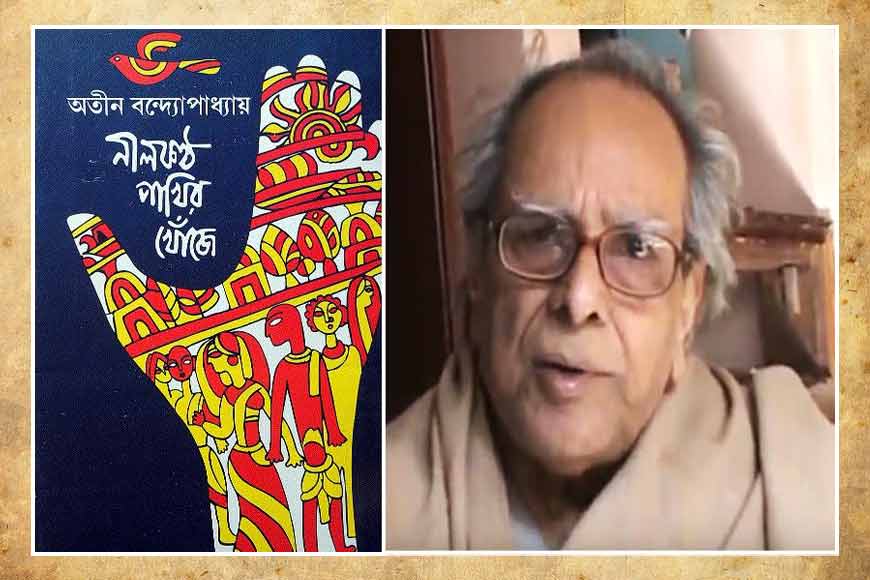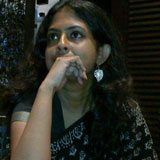'Nilkantha Pakhir Khonje' and the circle of life

With the COVID-19 second wave, we have seen death at its diabolical worst, when all allegories of life appeared to be devoured by the sheer annihilation of human life, dreadful spectacles of which kept circulating in the media, mainstream and alternative. Political pundits continue to debate the cause of such a monumental loss, many putting the blame squarely on administrative apathy and policy failures. Debate and discussions aside, the pandemic has already consumed half of another year and distress is slowly setting in, as an inexorable reality.
To persevere, in the face of the dark debilitation that distress so ineluctably induces, and to take refuge from the violence of the raging catastrophe, I turned to Atin Bandopadhyay’s 'Nilkantha Pakhir Khnoje', the book I go to when in agony and anguish.
Every time I open this long lyric, I find myself afloat on a slow moving stream. The stream flows but doesn’t necessarily take you anywhere. To not have a destination rids your mind of thoughts, helps you disarm and free float. Bandyopadhyay weaves words into a tapestry, intricate but never grandiose. It’s like a host that takes you in, gives you food and shelter and never asks for anything. You see your host going about life with an unhurried poise, living fully in the everyday moments of banality without harbouring any grand plan. Eshom’s tending to the watermelon plants, Shona’s endearing love for his mother and jethima (aunt), boro bou’s (wife of eldest son) fierce and focused love for her eccentric husband, Manindranath, Joton’s compassionate love for fakir-saheb, Malati and Ranjit’s fellowship and more importantly, the poetic and tender bonding between Shona and Fatema - all enfold with a lightness of being, as if cautious not to drag you out of your transported reverie with the fervour of emotional excess. Even the incidents of rape, murder, killings and riots are presented with carefully chosen words and expressions so that the axis of endurance is not shaken. As you turn pages, you find yourself settling down, your carefully crafted guards and armours fall off, your weary soul rests.
If there is anything larger than life in this long narrative, it is the character of Manindranath. In him we see a poetically endowed soul, whose angst and rage are expressed with a single expression, every time. This tacit response to all that he endured endears him to boro bou and the readers with overflowing empathy. You would almost like to embrace him to assuage his agony and torment. That he recites Keats when the pain becomes unbearable, creates the epiphany that grief in its excruciating extreme gives way to. At this stage of the story, these are possibly the only moments in the book where your reverie breaks, your heart breaks. Later, this pain will continue to assail you through boro bou's acute yet silent grief while yearning for her husband, who goes missing. In Manindranath’s wife, you will realise that extreme grief is love persevering.
Bandopadhyay draws a parallel between Manindranath and Felu, and in so doing, starkly establishes why Felu can never be Manindranath, even though his tragedy outdoes the latter’s by multiple levels, even though his tragedy begins with Manindranath’s eccentric act that paralyses Felu’s hand and dehumanises him instantly. The author keeps Felu devoid of beauty, and that ruins his prospect of acquiring empathy not only from his wife and fellow beings but also from readers. Obliterating the last possible hope for Felu, Bandopadhyay makes him Manindranath’s assassin. Is this why we see the creator of the character as the only one mourning his death? No. Bandopadhyay is too skilled to leave it at that. Hence, he had introduced us to Maijila Bibi, wife of Hajisaheb, with whom Felu had a clandestine love sequence, early in the book. Is clandestine the purer of the two? A ripple appears in your mindscape and expands. After death, it is this estranged wife who pours her heart out for Felu, visiting his grave in the middle of the night. Felu is redeemed in death, and you are relieved.
If you are a discerning reader, you will agree that the twin deaths are by no means inadvertent. Bringing home the axiom that death is a great leveller, Bandopadhyay crafts successive deaths of Manindranath and Felu, in the most macabre and grotesque of ways. While life wedged an unjust war of inequality and privilege between them, death by its very all-consuming nature of complete annihilation unites Felu and Manindranath.
Soon of course, in the plot as well as for you, Felu is forgotten. You quickly shift your attention to things far more epic in nature - you endure and mourn the fact of Manindranath’s death remaining unknown to his family which departs for India in the wake of Partition, and the ensuing disintegration of Thakur Bari.
As the book nears its end, incidents crowd in and a barrage of tragedies shake you out of your prolonged chimera. As the most endearing of characters, Shona, Fatema and her father suffer brutally from the vagaries of life and destiny, you wake up to reality. This is perhaps where the book stands out as a timeless classic by reiterating that the fundamental philosophy of life is a balancing act, that the axis on which life pirouettes is ever fixed, while the spokes of the wheel must change angles to ensure the universal continuum of time and space.
Your sojourn ends. You look back towards life not in anger but in devout acceptance. You are like the earth that has been readied for another yield. You are soft, malleable and moist; yet throbbing within you is the raw energy of possibilities.
Atin Bandopadhyay’s book is a panacea for today’s times; it cleanses, caresses and restores your spirit, but more importantly it empowers – something we all are seeking at this moment!










